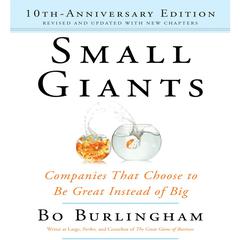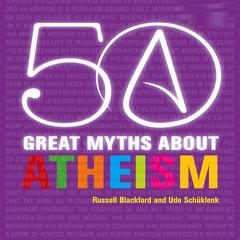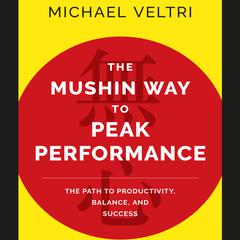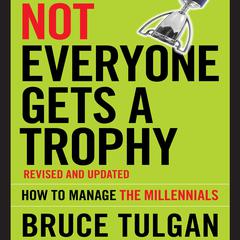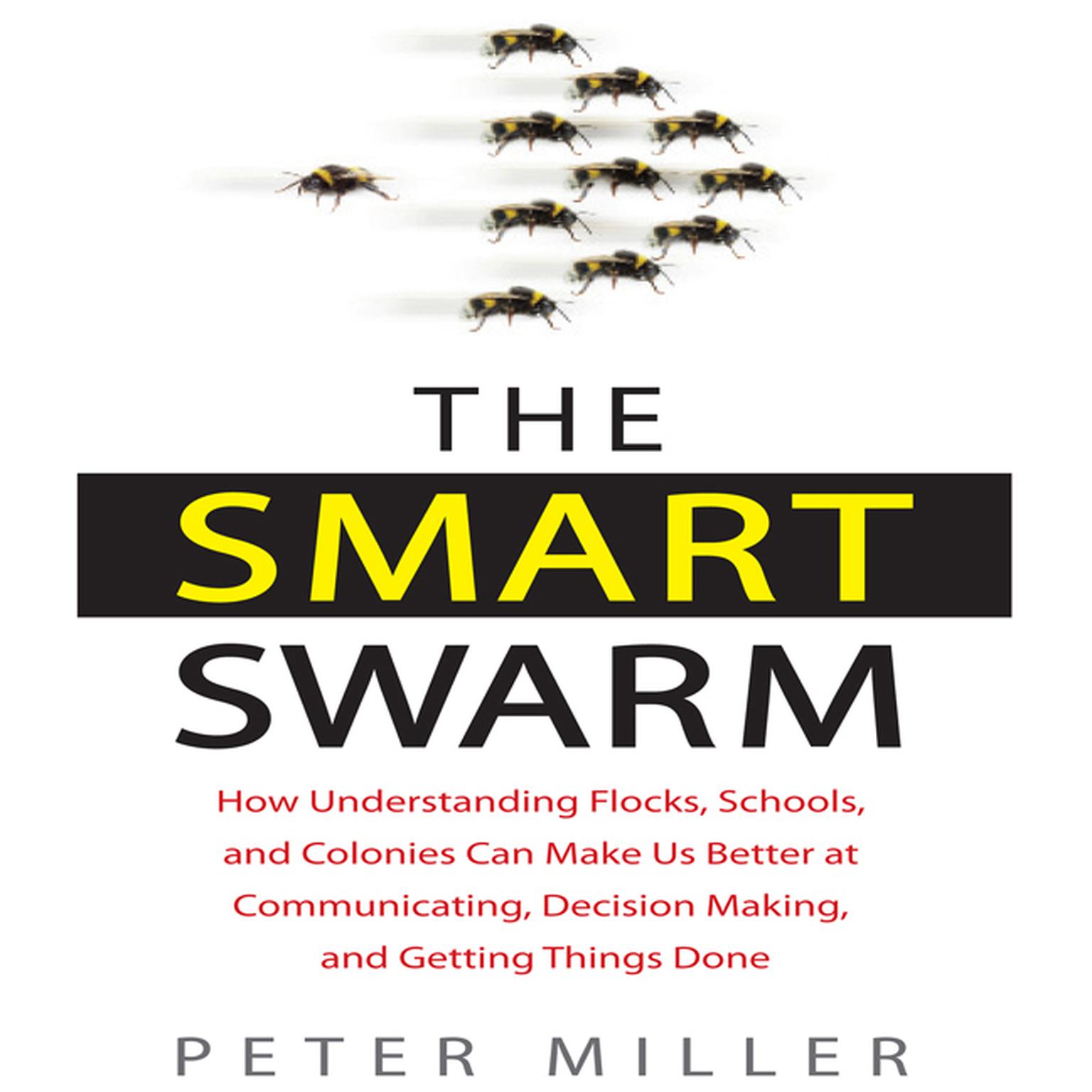 Play Audiobook Sample
Play Audiobook Sample
The Smart Swarm: How Understanding Flocks, Schools, and Colonies Can Make Us Better at Communicating, Decision Making, and Getting Things Done Audiobook
 Play Audiobook Sample
Play Audiobook Sample
Quick Stats About this Audiobook
Total Audiobook Chapters:
Longest Chapter Length:
Shortest Chapter Length:
Average Chapter Length:
Audiobooks by this Author:
Publisher Description
In a world where speed and flexibility are valued more than ever, leaders from the corporate boardroom to the military are looking for answers from seemingly unlikely experts—the ones in the grass, in the air, in the lakes, and in the woods. In this innovative audio book, veteran National Geographic editor Peter Miller explains the basic principles of smart swarms— self-organization, diversity of knowledge, indirect collaboration, and adaptive mimicking—to show how swarm species such as ants, bees, and fish can teach us to tackle some of the most complex conundrums in business, politics, and technology. By studying ant colonies’ simple governing rules, computer scientists have written programs to streamline factory processes, telephone networks, and truck routes. Termites have inspired climate control solutions, and the U.S. military is developing a team of robots that behaves like a school of fish. Groups in nature are the real specialists because they’ve evolved strategies over millions of years to cope with uncertainty, complexity, and change—the same challenges that make our lives and businesses difficult today. Leading scientists in fields from biology to physics, social psychology, and business management are all studying smart swarms to unlock their secrets, and Peter Miller takes us on a lively tour to show us how we can, too. A fascinating journey from the critter to the corporation, The Smart Swarm is an eye-opening look at small-scale phenomena with big implications for us all.
Download and start listening now!
"A good, quick read. This book left me in even more admiration for nature and the inventiveness of evolution. It's also fascinating to learn how we humans are learning to use nature's rules to solve some of our own problems. Worth reading for its educational and idea-generating bent."
— Marc (4 out of 5 stars)
The Smart Swarm Listener Reviews
-
" Fascinating studies of insects and how they work together to accomplish group goals, and how these principles have been applied to human situations. "
— Joan, 2/12/2014 -
" As a book about really cool things that animals do, it was very interesting and informative. As a book about how to apply those cool things to the realm of business, it was less so. There are enough differences between people and animals, and it seems that human conscious effort to prevent systemic failure might mess with the whole proposition of 'following simple rules to achieve surprisingly robust and complex and systems' too much. "
— doug, 12/9/2013 -
" Some really good insight here. Seemed to be padded out and ran out of steam near the end, but valuable nonetheless. "
— Phil, 12/2/2013 -
" A nice book that combines science and management. Honestly, I wasn't aware of the fact that we humans could learn a lot from ants, honey-bees, termites and birds on problem solving!! An interestting book! A 3.75/5 for this! "
— Ravie, 11/20/2013 -
" This a well written book that deals with how collective behavior in lesser animals works and how it may apply to man as to how we behave and decide and how crowds of people react. I found it fascinating. "
— Don, 10/16/2013 -
" okay...some anecdotes that are useful in explaining concepts to others, but nothing really new new here. "
— Mike, 10/5/2013 -
" I'm fascinated by emergent and self organising behaviour and what our species can learn from other inhabitants of this rock. This book is easy to read and absorb, even if it's your first foray into emergence. Really enjoying it as a bedtime read. "
— Anne, 8/7/2013 -
" Really liked this take on the "wisdom of crowds" genre. Very interesting embedded lessons. "
— Jessica, 2/17/2013 -
" Easy reading book linking the power of swarms/masses (ants, bees, termites, locusts, fish, etc) to our world (e.g. web 2.0, design of robotics, group behaviour, economy bubbles, etc). "
— Bart, 11/1/2012 -
" EXCELLENT. from tickling locusts to creating cgi orcs in the lord of the rings movie trilogy, swarms are used for almost anything you can think of. this book also explains how flocks of birds and schools of fish move in concert. recommended for everyone!! "
— Emily, 5/23/2012 -
" Fascinating insight into the nature of collective behaviour, showing how different species, including our own, can benefit or suffer from various swarm patterns. "
— Kaveh, 4/26/2012 -
" It's very hard to find good popular science books that are talking about features of everyday life. The book achieves to educate and entertain at the same time. "
— Nikos, 9/5/2011 -
" A very interesting first read on the theory of crowds and complex systems of organisms. Not terribly complex, but a great introduction to the field. "
— Darin, 6/25/2011 -
" This was an interesting book. From info about the waggle dance that bees use to communicate to each other about decisions the hive needs to make to neat quotes like "none of us are as stupid as all of us" in reference to the dark side of groups, I learned and was entertained. "
— Jim, 5/8/2011 -
" A very interesting first read on the theory of crowds and complex systems of organisms. Not terribly complex, but a great introduction to the field. "
— Darin, 4/9/2011 -
" Fascinating studies of insects and how they work together to accomplish group goals, and how these principles have been applied to human situations. "
— Joan, 11/6/2010 -
" EXCELLENT. from tickling locusts to creating cgi orcs in the lord of the rings movie trilogy, swarms are used for almost anything you can think of. this book also explains how flocks of birds and schools of fish move in concert. recommended for everyone!! "
— Emily, 9/15/2010 -
" Fascinating insight into the nature of collective behaviour, showing how different species, including our own, can benefit or suffer from various swarm patterns. "
— Kaveh, 8/14/2010
About Peter Miller
Peter Miller is a senior editor at National Geographic and has served as a writer and editor at the magazine for more than twenty-five years. He is the author of The Smart Swarm and lives in Reston, Virginia, with his wife.
About Lloyd James
Lloyd James (a.k.a. Sean Pratt) has been a working professional actor in theater, film, television, and voice-overs for more than thirty years. He has narrated over one thousand audiobooks and won numerous Earphones Awards and nominations for the Audie Award and the Voice Arts Award. He holds a BFA degree in acting from Santa Fe University, New Mexico.






